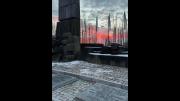As an undergraduate working for the New York University cinema studies department, Bruce Jenkins operated a technological device that has changed but little in the last century: the film projector. "I love it--it's the last vestige of the machine age in contemporary use," he says. "A decade from now, when film has become nothing but digital information on a screen, the only place to have that celluloid-based experience with that creaky machine will be in a film archive or museum." As the new curator of the Harvard Film Archive, succeeding its founder, Vlada Petric, Jenkins is steward of more than 5,000 films, the vast majority in 35-millimeter theatrical format. The archive will soon join the international association of film archives; Jenkins also hopes to raise its public profile. He comes to Harvard after 14 years as curator of film and video at the Walker Art Center in Minneapolis and with a Ph.D. in radio, television, and film from Northwestern. His academic specialty is experimental and avant-garde films, of which he cites one "gorgeous" example: Stan Brakhage's Mothlight, made sans camera, using "nothing but moth wings, blades of grass, and leaves pressed between strips of Mylar." He notes that "Hollywood is the dominant cinema, but it's not the only cinema and certainly not the most interesting cinema. Some of the greatest films ever made have been done by individuals--and for very little money." For pleasure he enjoys reading, bicycling--and film festivals. "This has been the century of cinema," he says. "Today, a film archive is what a classics department was a hundred years ago. Cinema is the Rosetta Stone of a culture increasingly based on moving images."
Bruce Jenkins
As an undergraduate working for the New York University cinema studies department, Bruce Jenkins operated a technological device that has...
Explore More From Current Issue
Making Green Energy Projects Financially Viable
A proposed “green” swap enables decarbonization of emerging market development projects.
Lawrence Bacow on the Auschwitz Memorial
President Lawrence S. Bacow reflects on the liberation of Auschwitz





